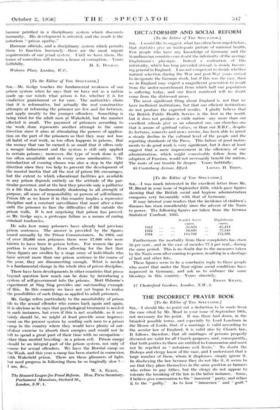[To the Editor of TILE SPECTATOR.] Gedge touches the fundamental
weakness of our prison system when he says that we have not as a nation made up our minds what prison is for, whether it is for vindictive punishment or for cure. The authorities claim that it is reformative, but actually the real constructive attempts at reforming the prisoner are few and far between, and apply mostly to the younger offenders. Something is being tried for the adult men at Wakefield, but the number affected is small. The payment of prisoners according to the work done represents another attempt in the same direction since it aims at stimulating the powers of applica- tion on the part of the prisoners so that they may not lose all habit of real work, as too often happens in prisons. But the money that can be earned is so small that it offers only a meagre inducement and the system is still only applied in certain prisons ; moreover, the type of work done is all too often unsuitable and in every sense uneducative. The introduction of evening classes was also a step in the right direction since they too help to prevent the development of the mental inertia that all the rest of prison life encourages, but the extent to which educational facilities are available in any prison depends entirely on the attitude of the par- ticular governor, and at the best they provide only a palliative to a life that is fundamentally deadening to all strength of purpose, all sense of responsibility or powers of self-reliance. Prismi life as we know it in this country implies a repressive discipline and a constant surveillance that must after a time unfit the prisoner to face the difficulties of life outside the prison walls. It is not surprising that prison has proved, as Mr. Gedge says, a grotesque failure as a means of curing criminal tendencies.
, He asks how many prisoners have already had previous prison sentences. The answer is provided by the figures issued annually by the Prison Commissioners. In 1934, out of over 33,000 men prisoners there were 17,600 who were knOwn to have been in prison before. For women the pro- portion is ,even higher. Even allowing for the fact that these figures are swollen by a stage army of individuals who have served more than one prison sentence in the course of the yeSr, they are disconcerting enough. What is needed is a fundamental change in the whole idea of prison discipline.
There have been developments in other countries that prove beyond question how much can be done by introducing a system of self-government into the prisons. Mott Osbbme's experiment at Sing Sing provides one outstanding example of this. In this country we have not yet begun to realise the possibilities of such things as applied to adult prisoners.
Mr. Gedge refers particularly to the unsuitability of prison life to the sexual offender who comes back again and again. It is obvious as he says that psychological treatment is needed in such instances, but even if this is not available, as it cer- tainly, should be, we might at least provide some improve- ment on the present system by sending such men to a prison camp in the country where they would have plenty of out- of-door exercise to absorb their energies and would not be left to spend a great part of their time with no occupation— other than morbid brooding—in a prison cell. Prison canniok should be an integral part of the prison system, not only of course for sexual offenders. We have the Borstal camp on the Wash, and this year a camp has been started in connexion with Wakefield prison. There are these glimmers of light, but need progress in following them be so tragically slow ?- I am, &c., The Howard League for Penal Reform, Hon. Press Secretary. Parliament Mansions, Orchard St., Landon, S.W. 1. W. A. ELKIN,










































 Previous page
Previous page